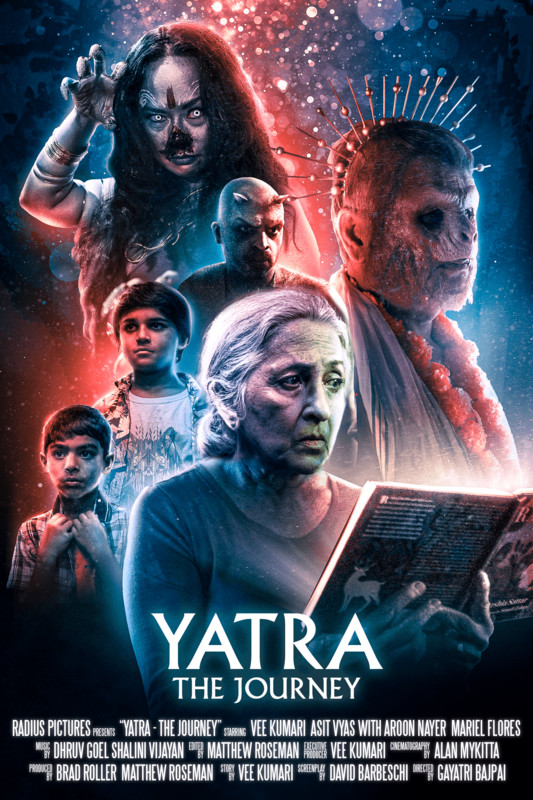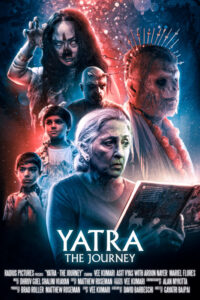
South Asian Short Film Review “Yatra: The Journey”
WATCH THE TRAILER HERE
First, the Recap:
Convictions. Not in the sense of criminality, but rather of innate and/or learned as well as experienced stances, perspectives on that which we strive to hold true to. While we might find that these creeds allow us to find peace, direction, and better outlooks on daily existence, what happens when this all gets shattered by the totally unexpected? Do we remain constant despite hardship, fighting through the pain when not having all the answers we desire? Or does it upend us and see doubts begin to enter in? Padma (Vee Kumari) finds herself in the midst of personal outward and inward anguish thanks to a recently encountered loss. With a newly formed skepticism of all that she once held as gospel, the road back to it will take a harrowing yet enlightening voyage of self-assessment and renewal of devotion to overcome the past, rescue two precious wards, in spite of the hurt, make a choice to triumph, and see strength of spirit and hope restored.
Next, my Mind:
Religious belief and supernaturally-infused fantasy intermixes with the potent realities of lost faith, good vs. evil, a need for redemption of soul, the healing of a broken heart, the draw of the past, letting go, and realizing the power within that’s presented with straight-forward, engaging, entertaining execution via this 19-minute short film effort from director Gayatri Bajpai, writer David Barbeschi, writer/executive producer Vee Kumari, producer Brad Roller, and producer/editor Matthew Roseman which relished its World Premier Sunday afternoon March 19th at the 2023 Los Angeles First Glance Film Festival. As with so many of both the mainstream and independent South Asian films this critic has had the opportunities to enjoy over the last seven plus years now, the indie realms once more showcase the heart, passion, drive, and desire for quality storytelling paired with relevant, compelling, and necessary messages to convey to the masses that DESERVE to have grander exposure and recognition within the worldwide film community.
Through a narrative that sees its cornerstone thematic basis steeped in core ideas found inside the Ramayana, a widowed woman having to confront actualities both past and present finding the courage to face gods and demons of legend while coming to the aid of two children that mean the world to her takes on its primary intents with a deft combination of literal and proverbial topical explorations involving the agony of absence, a deep questioning of what one believes in anymore when all that was trusted before appears to have failed, selfishness vs. selflessness, discovering a bravery we didn’t think we possessed, conquering one’s internal storms, and simply acknowledging the absolute importance of having a teachable spirit plus the will to be humbled in order to regain that assurance something bigger than us DOES have influence over our well-being, even when we may have initially given up, struggle with NOT believing it, and are in turmoil.
What surprised me a bit is that with all of this being exhibited, the film even manages to find a way to address the socially conscious subjects of family and gender inequality/discrimination, doing so in a manner that totally fits the film, even as the smaller themes. Additionally, this critic felt the narrative also takes on the concept of protecting innocence, which is certainly something in itself that sadly seems lost in the current world we inhabit, which therefore makes stories involving this stick out for me, and I know I greatly appreciate it being brought to us here. The culmination of all that’s depicted comes at us as the viewer with excellently delivered and highly meaningful impact as it should, again having provided both sheer entertainment and perfectly feasible believability and a grounded mentality that does justice to its purpose. Visually the film is an adept, effective, beautifully attractive, captivating, yet uncomplicated marvel that transports us into a mystical realm of eternal entities and real life, keeping things accessible to anyone, regardless of personal religion.
Also, the utilization of specifically choreographed movements for certain scenes and the characters involved stands out wonderfully here, as this aspect of South Asian cinema is so often seen and is an integral facet of their artistic expression. After having the chance to witness her poise and proficiency of acting talent in the 2019 short film “Halwa“, it was a pleasure to watch Kumari once more grace the screen, this time as Padma, a woman reeling from disheartening loss that has caused her to dispute within herself all that she used to press into in terms of the faith which she now feels has betrayed her. Finding some partial sense of solace in her job but moreso as a tutor to two young boys whom she enjoys sharing tales of wonder with, things take a turn for the surreal as she is suddenly propelled into an otherworldly place that puts all she is, knows, and wants to the test. Whether she is able to stand firm, be receptive to reflecting upon her choices, and then rise up and see a new revival of credence come into her life remains to be revealed.
It’s how Kumari so skillfully navigates Padma’s changing mindsets and the circumstances both in and out of her control she must endure that stands out for me, and I just adore Kumari’s undeniable charm and resolute intensity throughout the film that lends the story its true power and heart, giving us an “everyday” heroine to root for. Primary supporting roles arrive first via Asit Vyas in a role that encompasses embodying the titular Hindi god Hanuman who’s presence ushers Padma through the necessary doorways she needs to experience on the path to personal redemption and the quieting of her wavering belief. Aroon Nayer is next, in a dual role, as Sanchit, Padma’s overbearing and evidently chauvinist boss, and an eerily creepy demon known as a Rakshasa she runs afoul of. Mariel Flores delivers the second dual role as both Beth, one of Parma’s more supportive co-workers, and then as the menacing Shurpanakha, the ancient demoness whose machinations are behind the plight the two boys are victims of. All three if these actors do an incredible job at portraying the multiple characters they’ve been given to enact, and the performances speak for themselves in the film.
Natalie Polisson plays Julie, one half of the couple whose boys Padma tutors and will have to have her adventure to save. Adi Thakur is Avinash, the other half of said couple whose boys end up in that dilemma only Padma is able to solve. Rey Laredo is Mark, one of Padma’s other co-workers who tries his best to be a source of encouragement to her in the state of distress she’s in. Rayaan Kamal Khan and Suriyan Di Ianni are the two boys, William and Ashok, who must go through a frightening trial that Padma must save them from. An additional appearance is made by Sean Zerbe as a local detective aiding in the search for the boys, not knowing that his services may not be a main component required to see the sought after results. Finally, in voice part only, is Satish Ullal as Padma’s departed husband Vinod who really is the catalyst for all she must choose to rectify. So, in total, “Yatra: The Journey” is a steadfast, satisfying, pertinent statement about belief, trust, the notion of a higher hand watching over you, and the power of indisputable personal experiences in both dubiety and triumph that can define, or redefine, us. It’s the kind of story we all need to heed and apply. Period.
As always, this is all for your consideration and comment. Until next time, thank you for reading!




